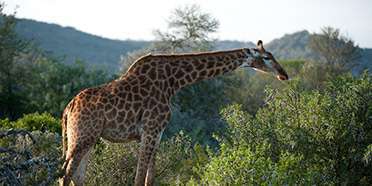- You are here:
- Home
- Countries & Parks
- South Africa Parks
- Shamwari Private Game Reserve
- Reviews
- Expert Reviews
Expert Reviews – Shamwari GR

Dale is a multi-award-winning writer and photographer with more than 500 published magazine articles featured in magazines such as National Geographic, BBC Wildlife, Travel Africa, and CNN Travel.
1 person found this review helpful.
Luxury, conservation, and the Big Five
As a conservation success story, the Shamwari Game Reserve in South Africa’s Eastern Cape is nothing short of a fairy tale.
Once, this relatively small 250-square-kilometer reserve was little more than a farm stocked with sheep and cows, crisscrossed with fences, and lacking in wildlife.
Now, after decades of dedicated work by the owners, Shamwari has once again become a self-sustaining ecosystem, teeming with all your favorite African animals.
It stands as a shining example of how a landscape can be successfully rewilded.
Of course, the reserve’s modest size and the historical background do somewhat diminish the true feeling of untouched wilderness one might find in places like the Serengeti or the Mara; but as an upmarket safari destination, Shamwari still manages to check most of the boxes.
A game drive at Shamwari promises encounters with elephants, black rhinos, buffalo, and lions, and if you cross your fingers tightly, you might also have the chance to spot a leopard or two.
The lodgings and meals are all as five-star as one could hope for, and its location (situated at the end of the Garden Route) offers a genuine safari experience in a popular region that generally lacks this type of attraction.

Christopher is a British travel writer and has contributed to various Fodor's guidebooks and a range of travel magazines.
2 people found this review helpful.
A slick conservation triumph
In recent decades, a number of malaria-free private game reserves have popped up all over the Eastern Cape, rehabilitating a wide variety of big game that had previously been eradicated from this region by hunting and heavy-farming. Shamwari has been around longer than most and remains the undisputed top of the pile as far as I am concerned.
Today, thanks to sterling and multiple-award-winning conservation efforts, Shamwari is home to all of the Big 5 in abundance. I brought my partner here last year for her first ever safari and we saw all 5 on day one, along with cheetah. Our guide that day had been at the reserve for 17 years, not an uncommon length of time here – Shamwari certainly seems to treat its staff well, and they deserve it. From my experience, all of the guides here remain among the best I’ve encountered anywhere in Africa.
And so do the lodges. All seven of the luxurious and exclusive five star options offer a completely different style and experience; the food and service are flawless. For me, the rehabilitated reserves in the Eastern Cape can never recreate that utterly raw and unadulterated bush feel, but there’s no denying that everything else about Shamwari operates like a very well-oiled safari machine.

Ariadne is a renowned African wildlife photographer whose work is featured in many well-known guidebooks and magazines.
3 people found this review helpful.
Shamwari: A wildlife haven in the Eastern Cape
Shamwari is the oldest and most established of a cluster of private wildlife reserves in the Eastern Cape. It’s location at the end of the popular Garden Route makes it an attractive safari option for people traveling this part of the country. It wasn’t always like that. The area was heavily farmed in the past and by the mid-19th century wildlife was mostly eradicated here. It is really good to see how Shamwari has rehabilitated the land and restocked it with a great variety of animals. All this obviously takes a fair amount of management, which perhaps tends to make a safari here feel a bit tame (also because of the relatively small size of the reserve). Shamwari is a Big Five reserve but leopard is rarely seen. All other big safari animals are usually ticked off during a two or three-day stay. What really makes a visit to Shamwari exciting is a good chance to see black rhino. This elusive and infamously aggressive cousin of the white rhino seems to thrive in the Albany thicket, the main vegetation in the area.

Emma is an award-winning travel writer for Rough Guides, National Geographic Traveller, Travel Africa magazine and The Independent.
3 people found this review helpful.
Award-winning private reserve with extremely high standards
Small enough for some to consider more of a zoo than a reserve, I nonetheless admire Shamwari’s high level of commitment to animal welfare and rehabilitation. Thanks to a careful wildlife stocking and management process, you can see the Big Five here, albeit in circumstances which feel rather tame; you can also learn about some of the challenges of wildlife conservation by visiting the Born Free big cat rescue centres within the reserve.
The accommodation is certainly sumptuous – a string of celebrity guests including Tiger Woods, Brad Pitt and John Travolta have all visited in recent years – and the family facilities are good. Overall, if you’ve already been to one of the larger, wilder parks and reserves and are looking for more of the same, you may feel let down by Shamwari, but if you’re new to safaris and appreciate comfortable surroundings you’re likely to love it.
Average Expert Rating
- 3.6/5
- Wildlife
- Scenery
- Bush Vibe
- Birding
Rating Breakdown
- 5 star 0
- 4 star 4
- 3 star 3
- 2 star 0
- 1 star 0


 South Africa Parks
South Africa Parks